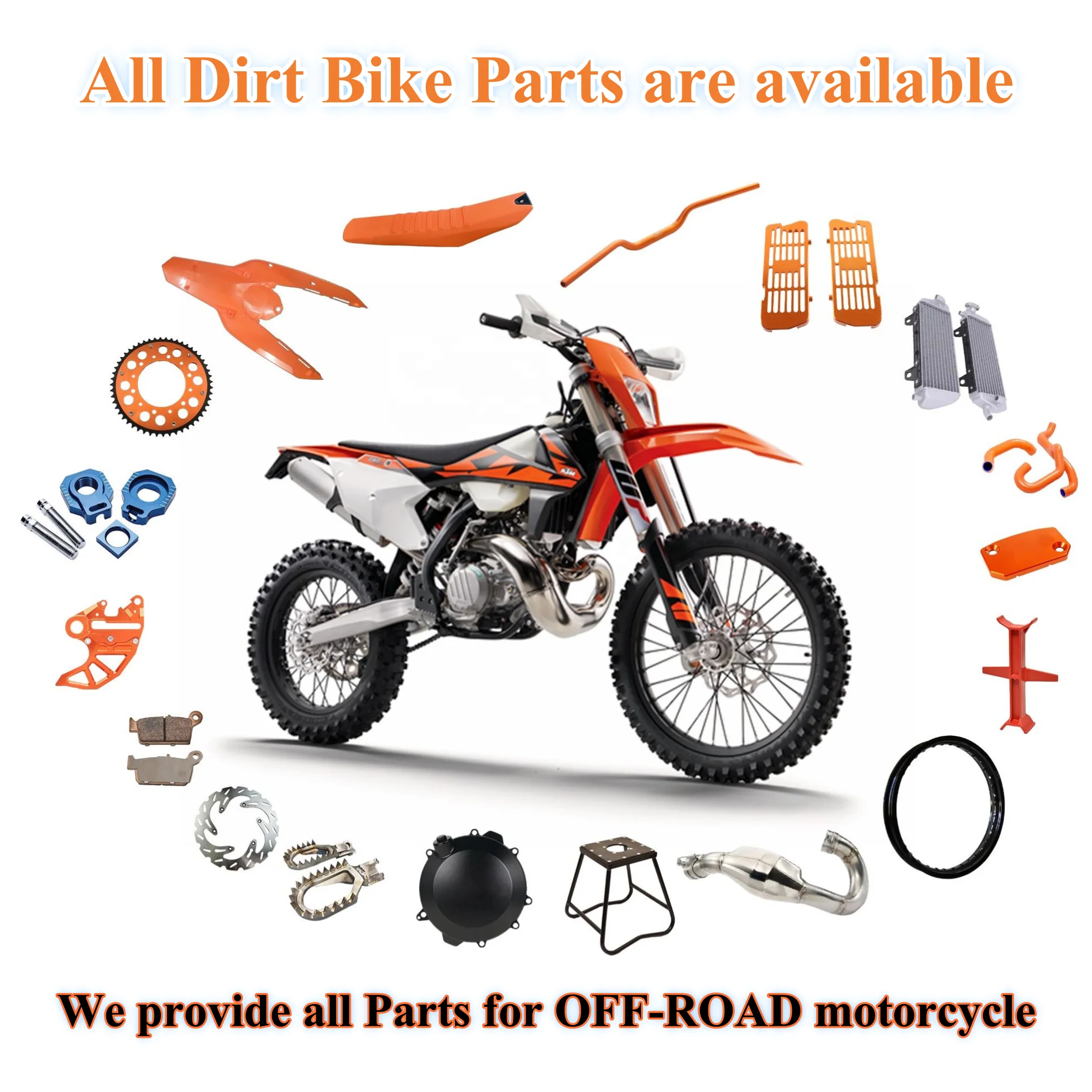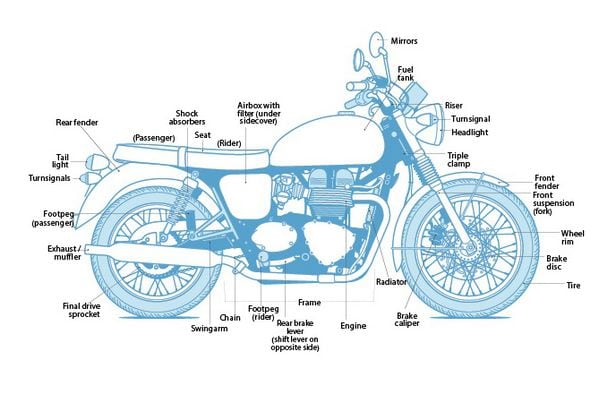Discover the Important MotorBike Components You Need for Optimum Efficiency
Recognizing the important parts of a motorbike is fundamental for achieving peak performance. Each part, from the engine to the stopping system, plays an important function in total performance and safety. Normal upkeep can protect against unexpected failures and boost the riding experience. Nevertheless, many motorcyclists overlook the complexities of these systems. Finding exactly how they collaborate can cause an extra reliable ride. What important components should every cyclist prioritize?
The Engine: The Heart of Your Motorbike
The engine acts as the core part of a motorcycle, driving its efficiency and specifying its capacities. It is liable for converting fuel into mechanical energy, which powers the bike forward. Various kinds of engines are used, consisting of single-cylinder, V-twin, and inline configurations, each offering distinct characteristics matched for various riding purposes and styles. The engine dimension, typically measured in cubic centimeters (cc), significantly influences efficiency, with larger engines usually providing even more power and torque.Furthermore, the engine's style and modern technology, such as gas injection systems or air-cooling versus liquid-cooling, influence performance and reliability. Upkeep is crucial for peak procedure; variables like routine oil adjustments and checking ignition system warranty long life. Cyclists frequently consider an engine's responsiveness and smoothness, as these qualities boost the general riding experience. Inevitably, the engine remains an important aspect that specifies not only the motorcycle's efficiency yet additionally the biker's link to the equipment.
The Transmission: Moving Gears Efficiently
The transmission plays a vital role in a motorbike's performance, particularly in the mechanics of gear changing. Comprehending how to change gears efficiently can improve the general riding experience, while normal upkeep warranties peak functionality. Proper attention to these facets can considerably influence the long life and performance of the motorcycle.

Equipment Shifting Mechanics
Smooth equipment shifting is essential for optimal motorbike performance, substantially impacting both velocity and control. The mechanics of gear changing entail the interaction in between the clutch, equipment lever, and transmission system. When a cyclist engages the clutch, it disengages the engine from the transmission, enabling for an equipment change without damaging the parts. A well-timed launch of the clutch, incorporated with accurate activity of the equipment lever, assists in a smooth adjustment in between gears. This process ensures that the engine runs within its best power band, boosting efficiency. Oem Parts New Zealand. Additionally, recognizing the equipment ratios and their impact on rate and torque can aid motorcyclists make informed choices throughout shifts, inevitably contributing to a much more pleasurable and responsive riding experience
Upkeep Tips Relevance
Routine maintenance plays an essential function in guaranteeing that the transmission system runs effectively, permitting for smooth equipment shifts. Consistently checking and changing the transmission liquid is essential, as old fluid can cause raised rubbing and wear. In addition, checking the clutch for wear warranties peak involvement and disengagement, stopping slippage during gear changes. Lubrication of moving parts is equally essential to decrease rubbing and improve performance. Bike proprietors ought to also monitor for leaks and uncommon sounds, as these can suggest underlying problems. By adhering to these upkeep tips, motorcyclists can lengthen the life expectancy of their transmission system, assuring that equipment changes remain smooth and adding to the general performance of their motorbike.
The Braking System: Ensuring Safety And Security on Every Trip
Braking systems are basic components that straight affect a motorcycle's security and efficiency. They are composed of numerous parts, consisting of brake pads, blades, calipers, and hydraulic lines, all working together to guarantee reliable slowdown. The sort of braking system-- usually either disc or drum-- impacts responsiveness and quiting power.Regular maintenance is vital to maintain peak efficiency; used brake pads can cause decreased effectiveness and increased stopping distances. In addition, the top quality of brake fluid ought to be kept track of, as it can soak up dampness in time, endangering stopping efficiency.Riders need to likewise consider the importance of anti-lock stopping systems (ABDOMINAL), which avoid wheel lockup throughout abrupt quits, boosting overall safety. Correctly working brakes are not nearly quiting; they infuse confidence in the motorcyclist, enabling much safer navigating via numerous surfaces. Inevitably, a trustworthy braking system is crucial for enjoying every adventure with comfort.
The Suspension: Enhancing Comfort and Control
A well-functioning suspension system substantially contributes to a motorbike's total performance, matching the performance of the braking system. The suspension plays a substantial function in taking in shocks from irregular surfaces, ensuring a smoother ride while preserving tire contact with the road. This call is necessary for both security and control, allowing riders to navigate edges with confidence and precision.Different types of suspension systems, such as telescopic forks or mono-shocks, supply varying levels of comfort and handling. Correctly tuned suspension improves responsiveness, offering the motorcyclist with a much more linked feeling to the motorcycle. Normal maintenance checks are essential to establish the suspension elements, consisting of springs and dampers, are functioning at their ideal. A reliable shock absorber not only boosts the riding experience yet also adds to the durability of other motorcycle parts by reducing damage. Consequently, spending in high quality suspension is important for any type of significant motorcycle lover.
The Tires: Linking You to the Road
Tires play a crucial duty in a over at this website motorbike's performance, functioning as the main web link in between the roadway and the motorcyclist. Understanding the different kinds of tires available can considerably influence managing and safety and security. Furthermore, routine maintenance is vital to assure peak tire performance and long life.
Tire Types Explained
Just how do various tire types influence a motorcycle's performance? Tire types play an essential duty in establishing a motorcycle's handling, stability, and grasp. Sporting activity tires, designed for high efficiency, offer enhanced traction and responsiveness on smooth roads, making them excellent for racing and hostile riding. Alternatively, visiting tires prioritize sturdiness and convenience, giving a smoother trip for long-distance travel. Off-road tires, characterized by their sturdy tread patterns, master grip on unpaved surfaces, suitable for experience enthusiasts. In addition, dual-sport tires blend characteristics from both on-road and off-road classifications, accommodating functional riding requirements. Inevitably, picking the appropriate tire kind is important for enhancing efficiency, ensuring safety, and improving the total riding experience.
Upkeep Tips Offered
While riding on the road, preserving excellent tire problem is vital for security and efficiency. Consistently inspecting tire pressure is very important, as under-inflated tires can lead to poor handling and enhanced wear. It is recommended find out here now to check walk deepness often; used tires compromise hold and stability. In addition, motorcyclists ought to search for signs of damage, such as bulges or fractures, which can indicate the need for substitute. Turning tires regularly ensures also use, boosting longevity. Keeping tires clean from particles and staying clear of too much aesthetics can prolong their life expectancy. Keeping appropriate placement and balance adds to come to a head efficiency, minimizing anxiety on various other bike components. Complying with these upkeep pointers will substantially improve the overall riding experience.
The Gas System: Fueling Performance and Performance
The gas system plays an important role in making best use of a motorcycle's performance and effectiveness, as it assures the optimum shipment of gas to the engine. It consists of numerous critical components, including the gas storage tank, fuel pump, gas filter, and gas injectors or carburetor. Each part must function properly to assure a smooth and effective ride.The gas container stores fuel and provides it to the engine through the gas pump, which creates the essential pressure. click for source A gas filter stops pollutants from getting in the engine, while the injectors or carburetor mix gas with air for combustion.Proper upkeep of the gas system is vital; a clogged up filter or malfunctioning injector can cause reduced efficiency and increased gas intake. By verifying that the fuel system runs successfully, riders can delight in better throttle reaction, better fuel economic situation, and on the whole enhanced riding experience.
The Electrical System: Powering Your Experience
A reliable electrical system is essential for the total functionality and safety and security of a motorbike, as it powers critical parts such as the ignition, illumination, and numerous digital systems. This system includes the battery, which stores energy, and the alternator, in charge of creating power while the engine runs. The circuitry harness attaches these elements, making sure trustworthy power distribution.Additionally, merges secure the system from overloads, while relays assist control high-current tools with low-power signals. A well-kept electrical system enhances efficiency by ensuring smooth starts and regular operation of signals and lights, crucial for motorcyclist exposure and safety.Regular checks of the battery's cost and connections are crucial for protecting against electrical failings. Bikers need to likewise evaluate electrical wiring for deterioration, guaranteeing all parts work preferably. Ultimately, a durable electric system contributes considerably to the total performance and dependability of the motorbike.
Frequently Asked Inquiries
How Usually Should I Replace My Motorbike's Battery?
The regularity of motorcycle battery replacement depends upon usage and maintenance (Motorcycle Spares Christchurch). Normally, batteries ought to be replaced every 3 to 5 years. Routine checks can help determine when a substitute is essential for peak efficiency
What Tools Do I Need for Fundamental Motorbike Upkeep?
For basic motorbike maintenance, one requires necessary tools such as a socket set, wrenches, screwdrivers, pliers, tire stress gauge, and a torque wrench. These tools assist in effective upkeep and guarantee the motorbike runs efficiently and securely.
Exactly How Can I Boost My Bike's The rules of aerodynamics?
To improve motorbike aerodynamics, one ought to think about readjusting fairings, using windscreen extensions, optimizing body position, and decreasing general weight. These adjustments assist reduce drag, improving stability and gas performance throughout experiences.
What Are the Indicators of a Failing Electric System?
Indicators of a falling short electric system include dimming lights, difficulty starting, uneven instrument readings, and blown fuses. Motorcycle Parts Auckland. Uncommon scents or rust around battery terminals may likewise show underlying issues requiring prompt interest for safety and security and efficiency

Just how Do I Pick the Right Oil for My Motorbike?
When selecting oil for a motorcycle, one should consider the manufacturer's requirements, viscosity rankings, and the sort of riding. Furthermore, traditional versus artificial oil can affect efficiency and engine defense, affecting the choice considerably. The engine dimension, usually determined in cubic centimeters (cc), significantly influences performance, with bigger engines typically supplying more power and torque.Furthermore, the engine's layout and modern technology, such as fuel injection systems or air-cooling versus liquid-cooling, impact efficiency and dependability. A well-functioning suspension system significantly contributes to a motorcycle's overall efficiency, matching the performance of the braking system. The fuel system plays a vital duty in taking full advantage of a motorbike's efficiency and performance, as it ensures the optimal shipment of gas to the engine. A fuel filter prevents pollutants from getting in the engine, while the injectors or carburetor mix fuel with air for combustion.Proper upkeep of the gas system is important; a clogged filter or malfunctioning injector can lead to reduced performance and raised fuel usage. A properly maintained electric system boosts performance by making certain smooth starts and regular operation of signals and lights, essential for motorcyclist presence and safety.Regular checks of the battery's charge and connections are essential for preventing electrical failings.
Comments on “A Deep Dive Into Performance Tuning with Bike Parts Wellington”